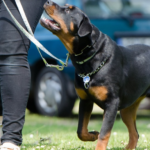Training a Rottweiler can be a rewarding experience, but it can also be challenging if you’re not familiar with the breed’s unique characteristics and needs. In this article, we’ll discuss five common mistakes that people make when training Rottweilers and how to avoid them. By following these tips, you’ll be able to build a strong and positive relationship with your Rottweiler.
Using Physical Punishment
One of the most important things to remember when training your Rottweiler is that physical punishment is never an effective or appropriate method. Rottweilers are sensitive and intelligent dogs, and using physical punishment will only damage your relationship with them and make them less likely to respond to your commands. Instead, use positive reinforcement methods such as rewards and praise to encourage good behavior.
Skipping Socialization
Socialization is an essential part of training for any dog, but it’s especially important for Rottweilers. These dogs were originally bred to work as herders and protectors, so they can be naturally wary of strangers and other animals. By exposing your Rottweiler to a variety of people, animals, and environments during the critical socialization period between 3-14 weeks old, you’ll help them become more confident and well-adjusted.
Not Establishing Leadership
Rottweilers have a strong sense of pack hierarchy, so it’s important to establish yourself as the leader of your “pack” right from the start. This doesn’t mean being aggressive or dominant, but rather being confident and consistent in your commands and setting clear boundaries. By setting yourself up as the leader, your Rottweiler will look to you for guidance and feel more secure.
Neglecting Exercise
Rottweilers are a large and energetic breed, and they require a significant amount of exercise to stay healthy and happy. If you don’t provide your Rottweiler with enough physical activity, they can become bored and destructive. Make sure to take your Rottweiler for regular walks, runs, and playtime to keep them physically and mentally stimulated.
Not Being Consistent
Consistency is key when training any dog, and Rottweilers are no exception. If you’re not consistent in your commands and expectations, your Rottweiler will become confused and will be less likely to respond to your training. Be consistent in your training methods, rewards, and punishment, and always use the same commands for the same behaviors.
Not Providing Mental Stimulation
Rottweilers are highly intelligent dogs that need to be mentally stimulated in order to stay happy and healthy. Neglecting to provide your Rottweiler with mental stimulation can lead to destructive behaviors such as chewing and digging. To keep your Rottweiler mentally engaged, try incorporating puzzle toys and training exercises into their daily routine. You can also teach them new tricks and commands which will not only keep them mentally stimulated but also strengthen the bond between you and your dog.
Not Being Prepared for a Rottweiler’s Size and Strength
Rottweilers are large and strong dogs, and they require a lot of space to move around and play. Neglecting to provide your Rottweiler with enough room to move can lead to them becoming restless and destructive. Additionally, their strength can also be a challenge to handle, thus it’s important to start training your Rottweiler early on to learn basic obedience and manners. Training your Rottweiler to walk on a leash, come when called, and stay calm around other people and animals will help you to have better control over your Rottweiler in any situation.
Not Understanding the Rottweiler’s Temperament
Rottweilers are known to be loyal, protective, and confident dogs but they can also be stubborn and dominant if not properly trained and socialized. Not understanding the Rottweiler’s temperament can lead to issues such as aggressive behavior or lack of obedience. It’s important to educate yourself about the breed’s characteristics, needs and temperament before getting a Rottweiler. Research and talk to experienced Rottweiler owners and breeders, to gain a better understanding of the breed. By having a clear understanding of the Rottweiler’s temperament, you will be able to adjust your training approach accordingly and provide the best environment for your Rottweiler to thrive.
Not Providing Proper Nutrition
Proper nutrition is essential to maintain a Rottweiler’s health and well-being. Neglecting to provide your Rottweiler with the right diet can lead to health issues such as obesity and joint problems. Rottweilers require a balanced diet that includes lean protein, healthy fats, and complex carbohydrates. It’s important to consult with a veterinarian to determine the right diet for your Rottweiler based on their age, activity level, and any health issues they may have. Additionally, it’s important to monitor your Rottweiler’s weight and adjust their diet as needed to maintain a healthy weight.
In conclusion
Training a Rottweiler can be a challenging and rewarding experience. By avoiding the common mistakes of using physical punishment, skipping socialization, neglecting exercise, not establishing leadership, and not being consistent, you can build a strong and positive relationship with your Rottweiler. Remember that positive reinforcement methods such as rewards and praise are the best way to encourage good behavior, and always be patient and persistent in your training.







